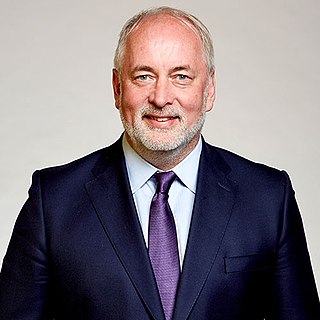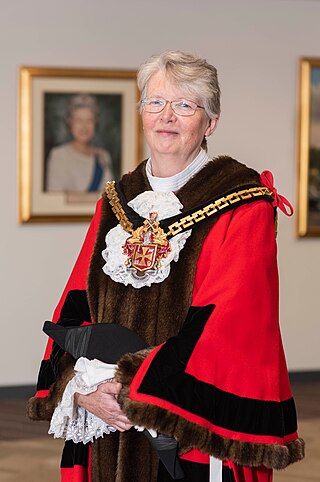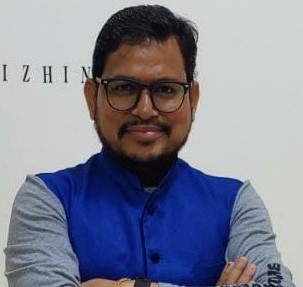
The University of Wolverhampton is a public university located on four campuses across the West Midlands, Shropshire and Staffordshire in England. The roots of the university lie in the Wolverhampton Tradesmen's and Mechanics' Institute founded in 1827 and the 19th-century growth of the Wolverhampton Free Library (1870), which developed technical, scientific, commercial and general classes. This merged in 1969 with the Municipal School of Art, originally founded in 1851, to form the Wolverhampton Polytechnic.
Technology governance means the governance, i.e., the steering between the different sectors—state, business, and NGOs—of the development of technology. It is the idea of governance within technology and its use, as well as the practices behind them. The concept is based on the notion of innovation and of techno-economic paradigm shifts according to the theories by scholars such as Joseph A. Schumpeter, Christopher Freeman, and Carlota Perez.

Uday B. Desai is an Indian academician and the founding director of Indian Institute of Technology Hyderabad. He is a Professor Emeritus in Electrical engineering Chancellor ICFAI Dehradun, Chancellor Anurag University, Hyderabad Honorary Distinguished Professor Plaksha University and a Strategic Consultant for TSDSI. He served as the director of IIT Hyderabad from June 2009 to July 2019, and is credited for taking it to rank among the top 10 engineering colleges in India in the NIRF engineering ranking. He was mentor director of IIT Bhilai from May 2016 to February 2017 and mentor director for IIIT Chittoor 2013–2018.
Yunas Samad is a British social scientist whose research is at the interface of sociology, politics and history. He is Professor of South Asian Studies and the Director of the Ethnicity and Social Policy Research Centre (ESPRC) at the University of Bradford. He is an expert on the study of South Asia and its diaspora and has published several books on the topic of Pakistani nationalism, ethnicity, Islam and the War on Terror. He regularly comments on the Muslim diaspora, politics and security issues in Pakistan for the BBC, the Dawn and other media outlets.
Carl E. Landwehr is an American computer scientist whose research focus is cybersecurity and trustworthy computing. His work has addressed the identification of software vulnerabilities toward high assurance software development, architectures for intrusion-tolerant and multilevel security systems, token-based authentication, and system evaluation and certification methods. In an invited essay for ACSAC 2013, he proposed the idea of developing building codes for building software that is used in critical infrastructures. He has organized an NSF funded workshop to develop a building code and research agenda for medical device software security. The final committee report is available through the Cyber Security and Policy Institute of the George Washington University, and the building code through the IEEE.

William Johnston BuchananOBE FRSE FBCS CEng PFHEA is a Scottish computer scientist. Buchanan is a professor in the School of Computing, Engineering and the Built Environment. He currently leads the Blockpass ID Lab and the Centre for Cybersecurity, IoT and Cyberphysical at Edinburgh Napier University. In 2017, he was appointed Officer of the Order of the British Empire (OBE) in the 2017 Birthday Honours for services to cyber security.
Institute of Informatics and Communication (IIC) is a constituent institute of the University of Delhi, in New Delhi, India. The institute offers degree in Masters of Science (Informatics). The institute was established in 1997 and has an intake of 78 students. The institute provides studies in the field of informatics, which is essentially a blend of three domains: networking, telecommunication and software, on three major platforms: Windows, Linux and Macintosh.

Nicholas Robert Jennings is a British computer scientist and the current Vice-Chancellor and President of Loughborough University. He was previously the Vice-Provost for Research and Enterprise at Imperial College London, the UK's first Regius Professor of Computer Science, and the inaugural Chief Scientific Adviser to the UK Government on National Security. His research covers the areas of AI, autonomous systems, agent-based computing and cybersecurity.
Debatosh Guha is an Indian researcher and educator. He is a Professor at the Institute of Radio Physics and Electronics at the Rajabazar Science College, University of Calcutta. He is an Adjunct faculty at the National Institute of Technology Jaipur and had also served Indian Institute of Technology Kharagpur as HAL Chair Professor for a period during 2015-2016.
Dr. Meena Dhanda is an Indian philosopher and writer, based in the United Kingdom. She is a Professor of Philosophy and Cultural Politics at the University of Wolverhampton, and is internationally recognised as a leading academic in the development of diaspora dalit studies. She conducts philosophy with a 'practical intent', and her work has confirmed existence of caste discrimination in Britain in areas covered by the Equality Act 2010, and pushed for more legal protections against caste-based discrimination.
Prashant Jha is an Indian-born physician, engineer and author. He is also working as consulting professor at All India Institute of Medical Sciences, New Delhi and IIT Delhi.

Nazira Karodia is a chemist, Professor of Science Education and Deputy Vice Chancellor at Edinburgh Napier University. She was previously Pro-Vice Chancellor for Regional Engagement at the University of Wolverhampton. She works on organic synthesis, green chemistry, heterocyclic compounds and science education.

Monique Morrow is a Swiss-American business woman, technology engineer and entrepreneur. She is president and co-founder of the Humanized Internet, a nonprofit focused on providing individuals with a digital identity. She was previously Senior Distinguished Architect of Emerging Technologies at Syniverse, and CTO and Evangelist of New Frontiers Development and Engineering at Cisco Systems, Inc. She sits on a number of advisory boards and has 17 patents related to digitalization, networks, the Internet of Things, cybersecurity, and the safe handling of data.
Ben Reid is a member of the board of directors of International Cooperative Alliance and former CEO of Midcounties Co-operative.

Claire Darke is a British Labour Party politician, who served as the Mayor of Wolverhampton. She is Councillor for Park Ward and was first elected in 2008 as a Liberal Democrat. She is the longest continuously serving female Mayor of Wolverhampton.
Andrea M. Matwyshyn is an American law professor and engineering professor at The Pennsylvania State University. She is known as a scholar of technology policy, particularly as an expert at the intersection of law and computer security and for her work with government. She is credited with originating the legal and policy concept of the Internet of Bodies.
Aggelos Kiayias FRSE is a Greek cryptographer and computer scientist, currently a professor at the University of Edinburgh and the Chief Science Officer at Input Output Global, the company behind Cardano.
Opinderjit Takhar MBE is a researcher and director of the centre for Sikh and Punjabi studies at the University of Wolverhampton.
Gregory Falco is an American inventor and researcher. Falco is a professor at Cornell University. He is a pioneer in the field of cybersecurity research and its aerospace applications. Falco is the founding chair of IEEE's Standard for Space System Cybersecurity.

Brij Bhooshan Gupta is a Distinguished professor with the Department of Computer Science and Information Engineering (CSIE), Asia University, Taiwan. He has published over 500 papers in journals/conferences including 30 books and 10 Patents with over 25,000 citations. He has also received numerous national and international awards including Clarivate Highly Cited Researcher in the world in Computer Science consecutively in year 2022 and 2023.








